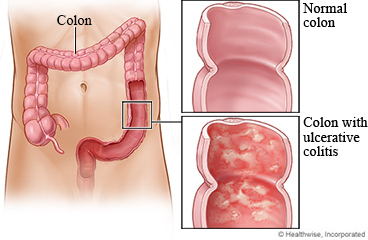
Overview
Ulcerative colitis is an inflammatory bowel disease (IBD). The large intestine (colon) gets inflamed and ulcers form in your colon. These ulcers can bleed.
People have "attacks" of ulcerative colitis. Attacks can come and go. They can cause painful belly cramps and bloody diarrhea.
This disease can affect part or all of the colon. How bad the disease gets will often depend on how much of the colon is affected.
Bad attacks are often treated in a hospital. There you can get medicines, fluid, and nutrition through a tube in your vein, called an I.V. This lets your digestive system rest and recover.
If the medicines don't work well, surgery may be needed to remove the colon.
At home, you can help control your ulcerative colitis. Take your medicines and try to eat well. And see your doctor as much as they recommend.
Follow-up care is a key part of your treatment and safety. Be sure to make and go to all appointments, and call your doctor if you are having problems. It's also a good idea to know your test results and keep a list of the medicines you take.
How can you care for yourself at home?
- Be safe with medicines. Take your medicines exactly as prescribed. Call your doctor if you think you are having a problem with your medicine. You will get more details on the specific medicines your doctor prescribes.
- Do not take anti-inflammatory medicines unless your doctor says it is okay. These include aspirin, ibuprofen (Advil, Motrin), and naproxen (Aleve). They may make your symptoms worse.
- Talk to your doctor before you take any other medicines or herbal products.
- Eat enough protein and drink plenty of fluids. During a flare-up, avoid foods that make your symptoms worse. These include foods high in fiber or fat and foods with lactose.
- Talk to a dietitian to make sure you are getting the nutrition, including vitamins and minerals, that you need.
- Take any nutrition supplements that your doctor prescribes.
- This disease can affect all parts of your life. Get support from friends and family or a counselor.
When should you call for help?
Call 911 anytime you think you may need emergency care. For example, call if:
- You passed out (lost consciousness).
- Your stools are maroon or very bloody.
Call your doctor now or seek immediate medical care if:
- You have new or worse belly pain.
- You have a fever.
- You have new or worse nausea or vomiting.
- You have new or more blood in your stools.
- You cannot pass stools or gas.
- You have pus draining from the area around the anus or pain and swelling in the anal area.
Watch closely for changes in your health, and be sure to contact your doctor if:
- You have new or worse symptoms, such as diarrhea that gets worse.
- You are losing weight.
- You do not get better as expected.
Where can you learn more?
Go to http://www.healthwise.net/patientEd
Enter F514 in the search box to learn more about "Ulcerative Colitis: Care Instructions".
Current as of: October 19, 2023
Author: Healthwise Staff
Clinical Review Board
All Healthwise education is reviewed by a team that includes physicians, nurses, advanced practitioners, registered dieticians, and other healthcare professionals.

